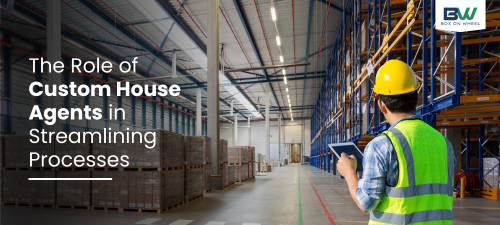CHAs have a crucial role to play in India’s dream of becoming a global trade hub. With logistics contributing to more than 22 million jobs, the role of CHAs is much more than just a facilitator for trade. As e-commerce and international trade continue to grow, so will the need for trained CHAs.
These agents act as a go-between for companies and the customs authorities in making complicated international trade procedures easier to understand. With the evolution of globalisation in trade, CHAs continue to play a pertinent role in the facilitation of regulations, compliance processes, and efficiency in supply chains.
This blog traces their critical responsibilities, issues, and contributions to economic growth in India.
1. The Core Responsibilities of Custom House Agents
CHAs maintain essential documentation needed for customs clearance, ensuring compliance with the relevant regulations. They prepare invoices, packing lists, and certificates of origin and submit customs declarations. Their expertise minimises the risk of delays or penalties from regulatory lapses.
They guide businesses in correctly classifying goods under the Harmonised System (HS). This ensures correct duty and tax calculations. By managing these intricate processes, CHAs save businesses from costly errors and compliance issues.
CHAs also make connections with customs authorities, assist in the coordination of inspections, and arrange necessary permits. Their liaison relationship with the customs facilitates clearances to happen efficiently. On-time clearances help a company save on losses related to delays.
2. Logistical Support and Optimisation
CHAs are much more than mere paperwork and compliance. They offer services relating to warehousing and distribution, among other logistical assistance, which facilitates smooth flow from ports to destinations.
Regulation-18 demands CHAs to update every phase of shipment. The practices promote transparency and ensure seamless activities. Such activities lead to more operational efficiency and low-risk exposure in the supply chain.
Such practices keep a company well-prepared in case of audits or inspection from any regulatory body. CHAs ensure a free flow of commodities while ensuring the most transparent logistics activity in a process.
3. A Smooth Journey Through Regulatory Issues
India’s export-import trade is always under the influence of changing policies and regulations. CHAs keep the businesses updated about such changes so that they are in line with the new laws.
Legal advisory services by CHAs help companies adapt quickly to new rules and avoid penalties.
For instance, CHAs help businesses understand duty drawbacks, exemptions, or incentives available under government schemes. This knowledge ensures businesses leverage all opportunities to reduce costs.
The adaptability of CHAs is crucial in sectors like pharmaceuticals and e-commerce. These industries depend on fast, compliant logistics to meet customer demands and international standards.
4. Addressing Infrastructure and Cost Challenges
Infrastructure gaps significantly hinder the logistics sector in India. Road conditions are poor, and railways are underutilised, causing difficulties in goods movement. Over 71% of freight is transported by road, whereas 18% is handled by railways, which skews the costs and has an impact on profitability.
Logistics costs in India have been at 13% of GDP, above the average of 11% for the BRICS. This is what needs to be brought down so that competitiveness is enhanced. CHAs assist businesses in navigating these inefficiencies by making use of their knowledge and contacts in the industry.
Government initiatives are working towards reducing these gaps. Dedicated Freight Corridors (DFCs) are nearing completion (around 96% complete as of April 2024) to increase rail freight capacity. Improved connectivity will reduce cost and enhance overall efficiency.
5. The Evolving Role of CHAs in India’s Growth
The country ranked higher in the Logistics Performance Index, at 38 out of 139 countries. It is on track to enter the top 25 by 2030 while keeping logistics costs below 10% of GDP. This will be made possible through CHAs, enabling smoother trade and better performance of supply chains.
Major sectors such as pharmaceuticals and e-commerce rely on CHAs to ensure compliance and efficiency. Their services are essential to businesses to meet strict requirements from international standards and even demanding customers.
Conclusion
Custom House Agents are the backbone of India’s logistics, making international trade smooth sailing. As India moves forward into becoming a global trade hub, CHAs will further drive growth and competitiveness. Businesses will be able to focus on core operations when customs processes are entrusted to CHAs, with logistics in expert hands.
Simplify your logistics with Box on Wheel. Streamline your shipping and storage needs for faster, safer deliveries today!

